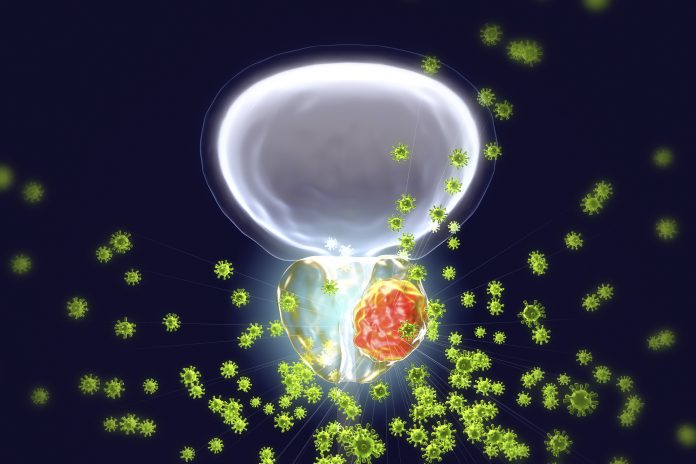
A City of Hope-developed CAR T cell therapy has shown it is both safe and produced promising therapeutic activity in patients with metastatic castration resistant prostate cancer (mCRPC). Results of the Phase I clinical trial were published today in Nature Medicine.
The study treated 14 patients with prostate stem cell antigen (PSCA)-positive mCRPC patients with cancer that had spread beyond the prostate and no longer responded to hormone therapy. The CAR T cells were engineered in the lab of Saul Priceman, PhD, an associate professor in the department of hematology & hematopoietic cell transplantation at City of Hope. The team reprogrammed a patient’s immune cells to recognize and attack the PSCA protein found on the surface of cancer cells, which were then reinfused in the prostate cancer patients.
“Prostate cancer has been called an immune desert—the tumor microenvironment is difficult to treat with immunotherapies because you don’t get a lot of T cells inside the tumor,” said Tanya Dorff, MD, City of Hope professor in the Department of Medical Oncology & Therapeutics Research. “It takes something really powerful to overcome that. Our study showed that City of Hope’s CAR T cell therapy for prostate cancer could be a step closer to doing that.”
The primary goals of the trial were to discover the CAR T therapy’s safety and dose-limiting toxicities that would limit the amount of the treatment that could be administered to patients. It also sought preliminary data on treatment efficacy.
For this study, participants received a single infusion of 100 million CAR T cells without prior lymphodepletion chemotherapy, a form of chemotherapy that has been shown to effectively improve cancer-killing activity of CAR T therapies for blood cancers. This step was taken to first assess the safety of CAR T cells alone in patients, since it was a first-in-human trial.
When lymphodepletion was added to a regimen with the same CAR T dose, the team found there was side effect of dose-limiting cystitis, an irritation of the bladder. This likely occurred because PSCA is also found in the bladder, leading the CAR T cells that were programmed to target PSCA to also attack bladder cells. A new cohort of patients who received reduced lymphodepletion showed that this approach mitigated this side effect.
From this dosing model, four of the 14 patients exhibited a decline in PSA levels including one patient that showed a significant decline. Imaging further showed therapeutic response in subset of the 14 patients. Adverse reactions for the treatment were noted in five patients who had mild cytokine release syndrome (CRS), but the researchers said it was a treatable side effect.
Like other trials for CAR T treatments targeting solid tumors, the CAR T cells in this trial did not persist at high levels past the 28-day monitoring period, though one patient who had received other prior therapies had his PSA level decrease by 95% along with declines in his bones and soft tissue, with positive response to the CAR T therapy last around eight months.
Based on these results the City of Hope team has launched a Phase Ib trial that combines the PSCA-CAR T cell therapy in combination with radiation treatments with the aim of enhancing its tumor killing activity.












